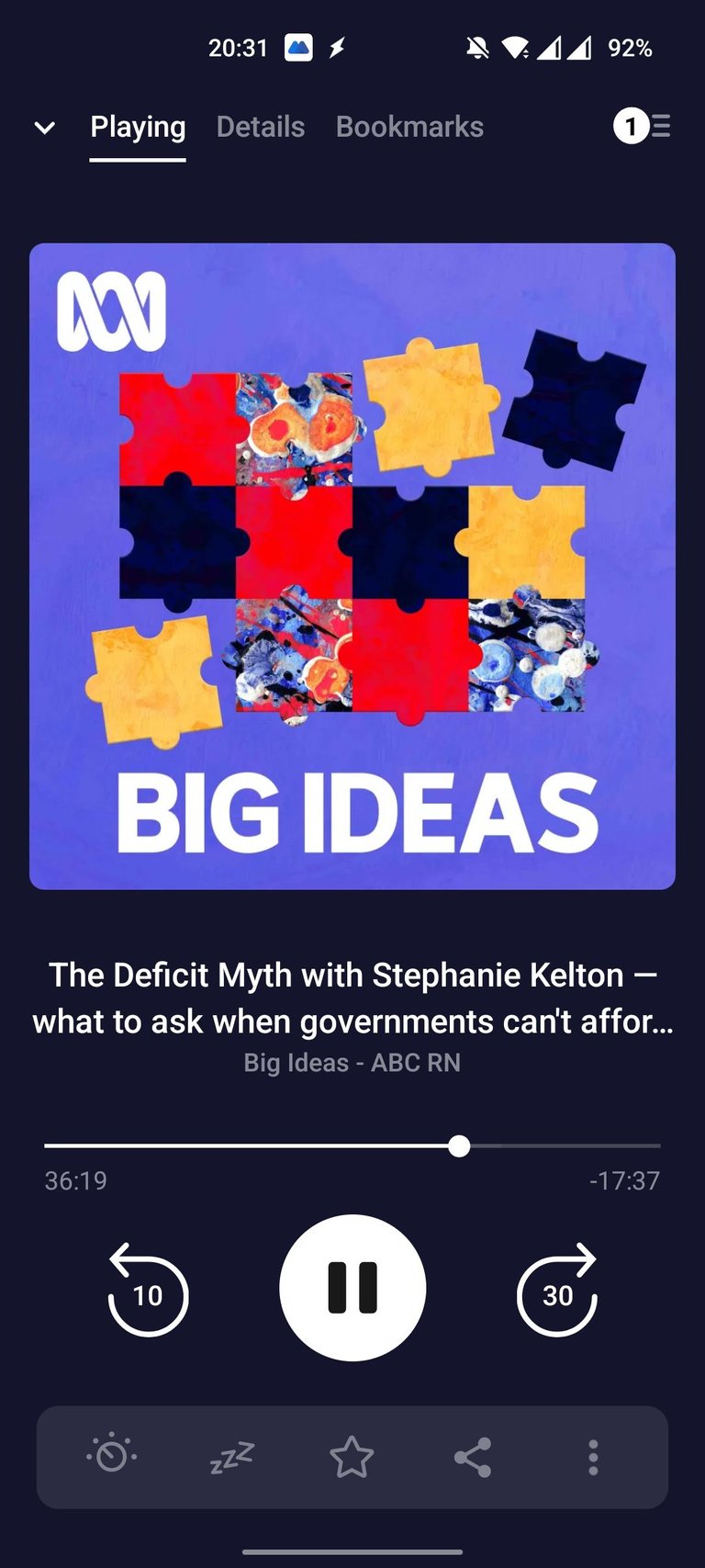Learning about Modern Monetary Theory (MMT)

I've been a bit intrigued about Modern Monetary Theory for a little bit... in the cryptocurrency sphere, it is quite maligned... as it seems to indicate that governments (or at least the sovereign issuer of a currency) are able to print money at will. And it is straw-manned to death...
... but like most ideas, there must be more to it than that. It isn't possible that something can get that much traction without some decent reasoning behind it, and I have been determined to learn more about the reasoning behind the non-orthodox economic theory.
First port of call was this podcast (HERE) by the author of the Deficit Myth (Stephanie Kelton) who is a proponent of Modern Monetary Theory.
Interestingly enough, there are quite a few overlaps with what crypto people think. MMT also thinks that fiat currency is really just a computer printing sort of thing that can be magicked out of thin air... and that the notion that it is wholly backed by something more substantial is really a fiction.
However, the main point of difference is in what they believe constrains a government from just printing infinitely. Modern orthodox (and most crypto) economics holds that the main constraint on government spending is the ability to "balance the books"... essentially that a government can't run into endless deficit and that it must try to aim to cut expenditure and ramp up income in the same way that "households" do to try and reduce public debt.
MMT holds that this is an illusion, and that it isn't a real constraint as governments can (and have) have deficits that can go out of control with money printing. This balancing of the books model of state spending only held true when the currency was redeemable for something (such as gold)... but in the current era of fiat currency, it makes no sense. Now, Bitcoiners will hold that the return back to redeemability or at least a form of hard currency is the way of the future... but it isn't clear that that is possible or desirable.
So, what does MMT hold as the true constraint on state spending? They see that inflation and the control of inflation is the true constraint on government spending. This does make much more sense to me... sure, it is easy to point to balancing the books as the easier more understandable option... but my time with Physics has led me to understand that the surface measurables aren't always the true things that you are trying to deal with.
The other point that did start to make more sense was the concept of state debt. Essentially, seeing state debt as inputs (increasing inflation) into the wider economy, and taxes and such things as soaks (inflation decreasers).... and this would give governments more targeted ways to tackle inflation (as opposed to the indirect interest rate superweapons of central banks). What this means is, that for each dollar of government debt, that appears in the community as a surplus...
... but the big question is WHERE does that appear as a surplus... in education, health, defence... or in the pockets of the rich?
And on that topic, MMT is mute... as it should be. Anyway, lots of food for thought... and the reminder that learning more in depth about a topic is always preferable to the memes and straw-manning of the internet.

I can also be found cross-posting at:
Hive
Steem
Publish0x
Handy Crypto Tools
Ledger Nano S/X: Keep your crypto safe and offline with the leading hardware wallet provider. Not your keys, not your crypto!
Coinbase Wallet: Multi chain wallet with lots of opportunities to Learn and Earn!
Binance: My first choice of centralised exchange, featuring a wide variety of crypto and savings products.
WooX: The centralised version of WooFi. Stake WOO for fee-free trades and free withdrawals! This link also gives you back 25% of the commission.
GMX.io: Decentralised perpetual futures trading on Arbitrum!
Coinbase: If you need a regulated and safe environment to trade, this is the first exchange for most newcomers!
Crypto.com: Mixed feelings, but they have the BEST looking VISA debit card in existence! Seriously, it is beautiful!
CoinList: Access to early investor and crowdsale of vetted and reserached projects.
Cointracking: Automated or manual tracking of crypto for accounting and taxation reports.
KuCoin: I still use this exchange to take part in the Spotlight and Burning Drop launches.
MEXC: Accepts HIVE, and trades in most poopcoins! Join the casino!
ByBit: Leverage and spot trading, next Binance?
OkX: Again, another Binance contender?

Account banner by jimramones
Posted Using InLeo Alpha

Join us today as we delve into Magic Money Theory where debt doesn't matter, deficits don't matter, and inflation is good. Are you a government looking to spend your future into oblivion today? Wanna fund those public works or fight that war? Well, we've got an idea for you!!!
!PIMP
!PIZZA
!PGM
You must be killin' it out here!
@definethedollar just slapped you with 1.000 PIMP, @bengy.
You earned 1.000 PIMP for the strong hand.
They're getting a workout and slapped 1/2 possible people today.
Read about some PIMP Shit or Look for the PIMP District
I also thought that when I was only reading the memes... but it turns out that there are very similar ideas with hard crypto/currency ideas. The argument is that since the conversion to fiat, that the deficit concept is an illusionary constraint... as no one holds to it anyway, because the money printer is able to print at will.
So, what is the true constraint? It is inflation, inflation is the true constraint on government spending... and once we identify the true constraint, then you can deal the problems properly. However, orthodox economics (New York...) has long been focused on the cart... and not the horse, and thus, we are in a deep deep hole.
Where it differs from crypto/Austrian/gold economics is the concept of whether it is possible/desirable to return to a redeemable currency or not.
However, you would find that there is more to it than what the memes make out!
$PIZZA slices delivered:
@definethedollar(1/20) tipped @bengy